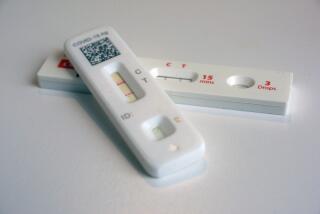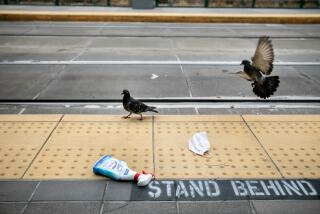Op-Ed: I made the hard choice to avoid COVID’s front line. Here’s why my fellow doctors may judge me
I’m a doctor at a teaching hospital, and a specialist in internal medicine. The patients I look after are often incredibly sick. But the most difficult decisions I’ve had to make this winter are about what to do with one very specific patient: me.
I have a history of unusually severe immune responses to common viral infections. Bone marrow suppression, hepatitis, arthritis, a rare nerve injury syndrome. It’s a black hole in my personal history, and despite extensive workups, a problem with no name. What could it mean, coupled with a new and unpredictable virus? I don’t know. Neither does anyone else.
You might think that a doctor with a health history like mine would avoid the front line of a novel viral pandemic. It isn’t that simple — and not just because about one-third of doctors have risk factors for severe COVID infection. Yes, the risks for many healthcare aides, respiratory therapists, nurses and cleaning staff are even higher, especially for members of some racial groups. But medical culture is incredibly complex when it comes to how doctors are socialized to take care of themselves.
Here’s a historical red flag: Doctors don’t even tend to take sick time. A few years ago, when I was an associate dean at a medical school, one of my students left me a message that he had appendicitis. He was in the middle of his surgery rotation, and the same team he had been working with performed his operation. I checked in with him 48 hours later and was horrified to discover that he was not only back at work but on call. In his actions, I saw a destructive pattern taking root, a pointless abandonment of a self that didn’t need to be abandoned. He was, after all, a medical student, not the lone doctor on call at the space station. But in a few short years, we’d socialized him to believe that he couldn’t even take time from a surgery rotation to tend to his own postoperative healing.
One of my own lightbulb moments was equally dramatic. Last year, I was working a three-week stretch on the wards. I couldn’t shake a nasty cough, couldn’t get enough rest between pages to kick a low-grade fever. By day 10, it was hard to climb the four flights of stairs to my office. I knew I should be home in bed. But there’s no safety net on most call schedules. And when workplace culture is to “suck it up” when you’re sick, the first response to a colleague’s illness is often resentment. (“I was back at work 48 hours after my appendectomy; why isn’t she?”)
The next morning, I was seeing a patient in the emergency department when I started coughing. I noticed a vile taste in my mouth: blood. I called a colleague who’d seen me in clinic a few times before, and she ordered an X-ray. It showed an ugly evolving pneumonia. She sent me home with antibiotics, steroids and inhalers. I spent the next 10 days barely moving from a mattress in the spare room, gagging on chicken broth, hardly able to get out of bed.
On the 11th day, my husband drove me to the airport. I was still lightheaded walking through the terminal. He watched until I disappeared through the gate at customs, where the border agent asked me why I was flying to California. I wish I could describe the look on his face as I said between barking coughs that I was going to Stanford to attend a course on physician wellness.
That story sums up the absurd culture I work in, a culture with a proud history of service, but an absurd dark side no profession should be proud of.
When COVID hit, the hospital sent out a memo asking staff with high-risk conditions to self-identify so they wouldn’t be assigned to the highest-risk settings — namely the so-called COVID wards. Weighing my medical history against my much-needed skill set, I asked two specialist colleagues who had looked after me in the past: What should I say? Without hesitation, both said I should identify myself as having a significant underlying condition. Are you sure? I pressed them, struggling with the same impulse my student had after his appendectomy. The colleague who’d treated my pneumonia, one of the wisest doctors I know, gave me the clearest directive. She said: “Please do not be a martyr.”
Trump bragged (falsely) about having the largest inauguration ever. Given the COVID numbers, Biden should claim bragging rights for the smallest crowd ever.
I wonder sometimes why I’m sad about having to draw this one thin line. I’m still working in the hospital and caring for people living with addiction, some of whom do turn out to have COVID. I worked in a high-risk setting with intubated patients during SARS in Toronto. I’ve spent 20 years managing complex and tragic cases, proving my commitment to this job over and over again.
Why can’t that be enough? I think it’s because something in our culture entices and rewards us for abdicating our duty to protect and care for ourselves. Like my student post-appendectomy, silently clutching his abdomen as he basked in the unmistakable approval of his colleagues, we have been conditioned to engage in behavior that might feel superficially heroic but isn’t actually in anyone’s best interest.
Canadian health journalist Andre Picard recently said of health workers and the COVID crisis, “Perhaps we should expect some heroism. But we should never demand martyrdom.” I never expected that COVID would help me understand the line between those two things. It was hard to define, but when I drew it, I knew it.
Jillian Horton is an internist in Canada and author of the forthcoming memoir “We Are All Perfectly Fine.” @jillianhortonMD
More to Read
A cure for the common opinion
Get thought-provoking perspectives with our weekly newsletter.
You may occasionally receive promotional content from the Los Angeles Times.











